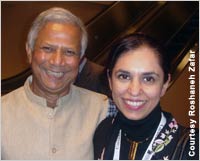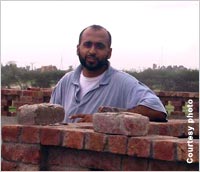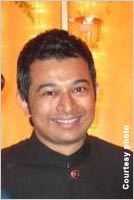Secretary of State Hillary Rodham Clinton backs a probe of human rights violations in Burma. We also have three more reports in our continuing coverage of the U.S. midterm elections, including one on President Obama’s campaign travels. The U.S. and Japan mark a 50 year relationship. The U.S. urges support for the Lebanese government. Obama’s portfolio for his coming trip to India is packed largely with economic issues. Learn how lost early American films turned up in a Russian film archive. You can study anything, virtually. In an international program for journalists, Bob Woodward stresses the importance of facts. Meet American fine-art photographer Peter Steinhauer and his Southeast Asian inspirations. And finally, here’s yet another reason robots are cool.
 A Focus on Human Rights in Burma
A Focus on Human Rights in Burma
Secretary of State Hillary Rodham Clinton backs an international inquiry into human rights abuses in Burma and pledges U.S. support for efforts to improve the lives of its citizens. Speaking in Hawaii at the beginning of a 13-day visit to the Asia-Pacific region, Clinton, right, promises to “seek accountability for the human rights violations that have occurred in Burma.”
Obama’s Daily Campaigning
President Obama was warmly welcomed to the popular comedy program The Daily Show, but during his lengthy interview with host Jon Stewart it became clear the appearance was very much a campaign stop. With congressional Democrats facing tough challenges in the 2010 midterm elections, the comedy show’s first interview with a sitting U.S. president was another in a series of more than 25 campaign stops for Obama in recent weeks.
The Muslim Vote in America
The week before national midterm elections in the U.S., discussions over Islam’s place in America is prompting American Muslims to make their voices heard through voting. Various Muslim organizations are working to acquaint American Muslims with the voting process and to encourage voter turnout.
America’s Endangered Senators
On Election Day, only 37 U.S. senators will be chosen, but some of those political contests are among the most contentious in the 2010 elections. The 2010 midterm elections include 12 Democrats and 11 Republicans seeking re-election and 14 “open” seats (no incumbent running) that currently are split evenly between Democrats and Republicans.
The U.S.-Japan Alliance at 50
Secretary of State Hillary Rodham Clinton and Japanese Foreign Minister Seiji Maehara marked the 50th anniversary of the U.S.-Japan alliance with praise for a relationship “based on deep friendship between our people, on mutual respect, and on common goals and values.” The two met in Honolulu on the first day of Clinton’s seven-nation Asia-Pacific tour.
U.S. Urges Support for Lebanon
The United States urges support for the Lebanese government as it works to reduce the threat posed by instability and conflict, says U.S. Ambassador to the United Nations Susan Rice.
Economy Tops Obama India Agenda
Expanding economic ties and growing business relationships between the United States and India will be atop the agenda as President Obama travels to South Asia beginning Nov. 6. Deputy National Security Advisor for International Economic Affairs Mike Froman says India represents “one of the most important emerging economic relationships for the United States, both multilaterally and bilaterally.”
 “Lost” Silent Films Found
“Lost” Silent Films Found
Some of America’s early film history that was thought to have been lost forever has been recovered. Ten films from Hollywood’s silent film era have been found in Gosfilmofond, the Russian state film archive, restored, copied and presented to the Library of Congress. “This is like finding a lost Picasso,” says Pat Loughney, chief of the library’s $200 million Packard Campus for Audio Visual Conservation. At left, a still image from the 1922 crime drama Kick In, one of the found films.
Learning Virtually Anything
Salman Khan hopes to make his online classroom “the world’s first free, world-class virtual school where anyone can learn anything.” Based in California, the Khan Academy received a $2 million grant from Google to build the software needed to translate its content into the world’s most-spoken languages.
Woodward on Journalism
American investigative journalist Bob Woodward met with some 150 journalists from 125 countries in an interactive session at the U.S. Department of State as part of the Edward R. Murrow Program for Journalists, named for the award-winning and pioneering broadcast journalist. Woodward stressed the importance of what he called “neutral fact-getting” and meticulous reporting.
Visions of Vietnam
American Peter Steinhauer is a successful Hong Kong-based fine-art photographer whose work is displayed in museums and galleries worldwide, and also at the U.S. embassies and consulates in Vietnam and Burma. Steinhauer was inspired by a 1993 trip to Vietnam, and his work primarily consists of landscapes and portraits portraying Vietnamese culture.
 Robots Draw Kids to Science
Robots Draw Kids to Science
Robots that kick soccer balls, solar-powered vehicles and helmets that offer virtual bike rides were some of the attractions at America’s first national science exposition, the grand finale of two weeks of activities intended to motivate more young people to pursue careers in science. The expo drew an estimated half million visitors to the National Mall in Washington, D.C.



















